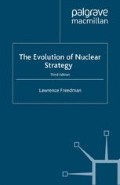Abstract
As controversial as McNamara’s desire to improve the Alliance’s conventional option was his desire to dissuade the Europeans from developing their own nuclear options. The distaste for the independent nuclear deterrents was not solely a question of saving resources for conventional weapons. It was also related to concepts of controlled nuclear warfare, in which, even after the nuclear fire-break had been breached, an attempt would still be made to prevent matters getting out of hand. Reflecting the scientific bent of the time, and indicating the indeterminate possibilities for proliferation, the issue was then described as ‘The Nth Country Problem’, a term that has now happily passed out of fashion.1 By giving anonymity to the offending country, the term suggested that the problems were similar whoever the Nth power might be. One of the frequent observations on this matter was that whereas the Nth power viewed his own acquisition of nuclear weapons as being fully justified, he would probably see any N + 1th power as a threat to world peace.
Preview
Unable to display preview. Download preview PDF.
Notes
See, for example, National Planning Association, The ‘Nth Country’ Problem and Arms Control (New York: NPA, 1959). A corrective to some of the pessimism on the subject is found in Fred Iklé, ‘Nth countries and disarmament’, Bulletin of the Atomic Scientists, xvi:10 (December 1960). A useful compilation of articles is R. N. Rosencrance (ed.) The Dispersion of Nuclear Weapons (New York, Columbia University Press, 1964).
Albert Wohlstetter, ‘Nuclear sharing: NATO and the N + 1 country’, Foreign Affairs, xxxix: 3 (April 1961).
Thomas Schelling, ‘Nuclears, NATO and the “New Strategy”’, in Henry Kissinger (ed.), Problems of National Strategy (New York: Praeger, 1965), p. 179. Schelling regretted (with hindsight) that McNamara’s new strategy was used as an ‘argument against independent nuclear deterrents. The new strategy was new enough, at least in public discussion, to need a sympathetic audience.’
John Garnett, ‘British strategic thought’, in John Baylis (ed.), British Defence Policy in a Changing World (London: Croom Helm, 1977), p. 163.
Hedley Bull, ‘International theory: the case for a classical approach’, World Politics (April 1966).
The key articles in the resultant debate are collected in Klaus Knorr and James Rosenau (eds.), Contending Approaches to International Relations (Princeton: Princeton University Press, 1969).
John Groom’s British Thinking About Nuclear Weapons (London: Frances Pinter, 1974) has virtually nothing on the period after the early 1960s.
One attempt to do so is a sharp little book by Emanuel J. de Kadt, British Defence Policy and Nuclear War (London: Frank Cass, 1964). He spoke of Britain’s ‘[non-independent] contribution to the total Western nuclear force’, as being ‘insubstantial and, moreover, unwanted’, p. 130.
Stephen King-Hall, Power Politics in the Nuclear Age: A Policy for Britain (London: Gollancz Ltd, 1962), p. 171 (emphasis in original).
John Strachey, On the Prevention of War (London: Macmillan, 1962).
The problems of miscommunication in this affair are examined in Richard Neustadt, Alliance Politics (New York: Columbia University Press, 1970).
Television interview of February 1958. Andrew Pierre, Nuclear Politics: The British Experience with an Independent Strategic Force, 1939–1970 (London: Oxford University Press, 1972), p. 178.
Lawrence Freedman, Britain and Nuclear Weapons (London: Macmillan, 1980).
Author information
Authors and Affiliations
Copyright information
© 2003 Lawrence Freedman
About this chapter
Cite this chapter
Freedman, L. (2003). The European Nuclear Option: (i) Anglo-Saxon Views. In: The Evolution of Nuclear Strategy. Palgrave Macmillan, London. https://doi.org/10.1057/9780230379435_20
Download citation
DOI: https://doi.org/10.1057/9780230379435_20
Publisher Name: Palgrave Macmillan, London
Print ISBN: 978-0-333-97239-7
Online ISBN: 978-0-230-37943-5
eBook Packages: Palgrave Political & Intern. Studies CollectionPolitical Science and International Studies (R0)

